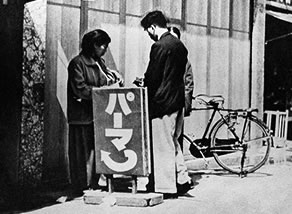History with Anti-social Forces
The pachinko parlor business has historically often had ties with anti-social forces that are associated with gambling since pachinko parlor entertainment involves gambling. In addition, people also have a strong negative image of the pachinko parlor business because they may be avoiding taxes while generating significant sales or performing illegal acts such as the purchasing of prizes, and anti-social forces have taken advantage of these weak points of pachinko parlor operators.
In addition to requiring bodyguard service fees, protection money and the demand that various goods be purchased, which are common to amusement centers in this type of service industry, there was a case that anti-social forces requested a pachinko parlor provide games that heightened the gambling spirit of its customers so that prize exchange stations managed by these anti-social forces would be used for obtaining resale profits of prizes. Anti-social forces have approached pachinko parlors by using various excuses as described above and the management of pachinko parlor operators who did not comply with those requirements and demands have suffered from various acts of harassment. On the other hand, in some cases in the past, the management of pachinko parlor operators also took advantage of the power of anti-social forces to protect its own parlors to resolve problems with customers or a group of cheaters.
A long time ago, from 1945 to around 1960, while the pachinko industry greatly flourished along with an increase in gambling properties with pachinko game machines, cases of making profits and acts of violence occurred as a result of intervening anti-social forces which would purchase and repurchase prizes, and this became a social problem in various regions. In particular, the purchasing of prizes on the street was generally carried out without involvement of a pachinko parlor, which however resulted in the introduction of regulations for all pachinko parlor operators. More specifically, prohibition of successive shot pachinko machines which increased the customers passion for gambling and had a great impact on the industry. The “Anti-Nuisance Ordinance” currently established by local governments was refered to as the “Hooligans Prevention Ordinance” in the decade from 1955 and focused on the prevention of violent and nuisance acts conducted by hooligans that were social problems at that time. These ordinances even included provisions which prohibited the “purchasing of prizes” on the street.

A series of these incidents occurred in the latter half of the 1940’s which subsequently resulted in the industry reflecting on this style of business. Some regions have regulated the provision prizes that were easily traded for “purchased prizes” on the street, and other regions have established a system to break off relationships with anti-social forces by forming an organization (one of the purposes of which was to promote the employment of disabled persons and widows) and making the organization handle the prizes. In addition, one of the excuses for the intervention of anti-social forces was caused by situations where prizes of lower value were passed between the same pachinko parlor and the prize exchange station. Therefore a system to resolve this type of situation was developed. Now, it is common for there to be an arrangement where an established organization of distributors and corporations handle such systems. Throughout Tokyo, a system that no relationship will be had with anti-social forces when providing prizes at pachinko parlors has been established.
Continuous Activities for to Exclude Anti-social Forces
Relationships with anti-social forces as stated above are threatened to arise in any event other than prize issues. Even if a relationship was broken off once, acts of intimidation against pachinko parlor operators actually have occurred, and even now, demands have been made of pachinko parlor operations to once again have a relationship with anti-social forces. The industry must not provide material funds for activities of anti-social forces in any way. However, these issues cannot be addressed only by efforts of the industry. Support particularly from the police and government is essential.
The police and government have actively assisted in breaking off any ties between the pachinko parlor business and anti-social forces by focusing on controls and exposure of incidents where anti-social forces are involved. Police officers and the government have provided lectures to promote compliance with the ordinances to exclude violation at meetings of regional industrial associations. The regional industrial associations have also adopted resolutions to exclude anti-social forces. Some regions have formed councils or Coordinating Committees. The exclusion of anti-social forces and prevention of re-involvement with anti-social forces is one of the subjects of a series of initiatives against anti-social forces that is continuously conducted.
The industry associations have also conducted a crusade against profits generated from false strategies for pachinko games and profits of cheating groups as there is a concern that such profits are provided to anti-social forces.